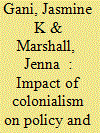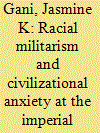|
|
|
Sort Order |
|
|
|
Items / Page
|
|
|
|
|
|
|
| Srl | Item |
| 1 |
ID:
183863


|
|
|
|
|
| Summary/Abstract |
Ten years on since the Arab uprisings we are in a position to assess how the nexus between knowledge, discourse and practice had a bearing on the trajectory of the protests. They represented hope and change for millions of Arabs in the region, but to what extent was that the case for onlookers in Europe and the US, and did western discourse on events in the Middle East matter? While the toppling of longstanding dictators was met with jubilation by Arab populations, it conversely created anxiety and fear in many western governments. This was reflected in the shift from an initially celebratory discourse in western commentary to disappointment, pessimism and disavowal of the uprisings. Within a year, op-eds and academic articles were asking whether the ‘Arab Spring’ had turned into an ‘Islamist winter’, reverting to Orientalist narratives about the inevitability of conflict, bloodshed and sectarianism in the Middle East. I argue this discourse had implications for the outcome of the uprisings as ‘latent Orientalism’ translated into ‘manifest Orientalism’ and western states hesitated to support opposition groups they initially encouraged and emboldened. I begin the article with a study of western discourse in the first year of the uprisings, which I then situate within a long durée history of western policy and representation of the Middle East. In the final sections I consider the role of scholarship and think tanks as mediators of Orientalist discourse.
|
|
|
|
|
|
|
|
|
|
|
|
|
|
|
|
| 2 |
ID:
183861


|
|
|
|
|
| Summary/Abstract |
Is there an academic–policy divide, and does that gap need to be bridged? For decades, International Relations (IR) scholars have reflected on their roles and responsibilities towards the ‘real world’, while policy-makers have often critiqued the detachment of academic research. In response, there have been increased calls for academics to descend from their ‘ivory tower’. However, the articles in this 100th anniversary special issue of International Affairs interrogate this so-called theory–policy divide and problematize the exchange of knowledge between academics and practitioners, highlighting the colonial underpinnings of their historical entanglements. In this introductory article we bring together the core arguments of the special issue contributions to delineate three prominent dynamics in the academic–practitioner nexus: the role of academia as a supplier of knowledge for colonial policies; the influence of imperial practice and policy-makers in shaping IR and academic knowledge production; and the contestation from academics and/or practitioners against racial hierarchies in knowledge production and policy-making. Confronting the exclusions, amnesias and denials of colonialism in the theory and practice of International Relations is the necessary first step in any process of repair towards a more just and viable politics.
|
|
|
|
|
|
|
|
|
|
|
|
|
|
|
|
| 3 |
ID:
182659


|
|
|
|
|
| Summary/Abstract |
In this article, I ask three key questions: First, what is the relationship between militarism and race? Second, how does colonialism shape that relationship to produce racial militarism on both sides of the imperial encounter? And, third, what is the function of racial militarism? I build on Fanon’s psychoanalytic work on the production of racial hierarchies and internalization of stigma to argue that militarism became a means through which the European imperial nation-state sought to mitigate its civilizational anxiety and assert itself at the top of a constructed hierarchy. In particular, I argue that European militarism is constituted by its colonization and historical constructions of the so-called Muslim Orient, stigmatized as a rival, a threat and an inferior neighbour. However, this racial militarism and civilizational anxiety is not only a feature of the colonial metropole, but also transferred onto colonized and postcolonial states. Drawing on examples of racial militarism practised by the Syrian regime, I argue Europe’s racial-militarist stigmas are also internalized and instrumentalized by postcolonial states via fleeing and transferral. Throughout the article, I demonstrate that racial militarism has three main functions in both metropole and postcolony: the performance of racial chauvinism and superiority; demarcation of boundaries of exclusion; and dehumanization of racialized dissent in order to legitimate violence.
|
|
|
|
|
|
|
|
|
|
|
|
|
|
|
|
|
|
|
|
|